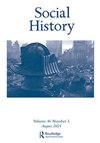制造空间:朝向种姓社会现代性的空间历史
IF 1.1
1区 历史学
Q1 HISTORY
引用次数: 2
摘要
一个充满活力的公共领域已经被认为是现代民主的必要条件。j本文章由计算机程序翻译,如有差异,请以英文原文为准。
Making space: towards a spatial history of modernity in caste-societies
ABSTRACT A vibrant public sphere has come to be recognised as a necessary condition of modern democracies. Jürgen Habermas’s work has been a convenient point of departure for studies concerned with the concept of the public sphere and modernity, despite evidence mounting from feminist, postcolonial and subaltern studies that its despatialised nature and universalistic assumptions render invisible large groups that remained – temporally and spatially – outside the ‘mainstream’. Using examples from colonial and early modern India, this article demonstrates how these limitations play out in complex societies and why ‘space’ is pivotal in studying the public sphere, especially in caste societies. Following the spatial (re)turn within academia in the last decades, I argue that Henri Lefebvre’s work on social spaces provides a theoretical alternative that treats space with analytical rigour, allowing us to problematise the concept of the public sphere and to move away from Western Europe as an ‘ideal type’. The article demonstrates how an approach that is informed by Lefebvre’s framework is particularly useful in societies where caste influences spatiality and, consequently, lived experience – as well as having broader resonance and application.
求助全文
通过发布文献求助,成功后即可免费获取论文全文。
去求助
来源期刊

Social History
HISTORY-
CiteScore
1.10
自引率
0.00%
发文量
37
期刊介绍:
For more than thirty years, Social History has published scholarly work of consistently high quality, without restrictions of period or geography. Social History is now minded to develop further the scope of the journal in content and to seek further experiment in terms of format. The editorial object remains unchanged - to enable discussion, to provoke argument, and to create space for criticism and scholarship. In recent years the content of Social History has expanded to include a good deal more European and American work as well as, increasingly, work from and about Africa, South Asia and Latin America.
 求助内容:
求助内容: 应助结果提醒方式:
应助结果提醒方式:


